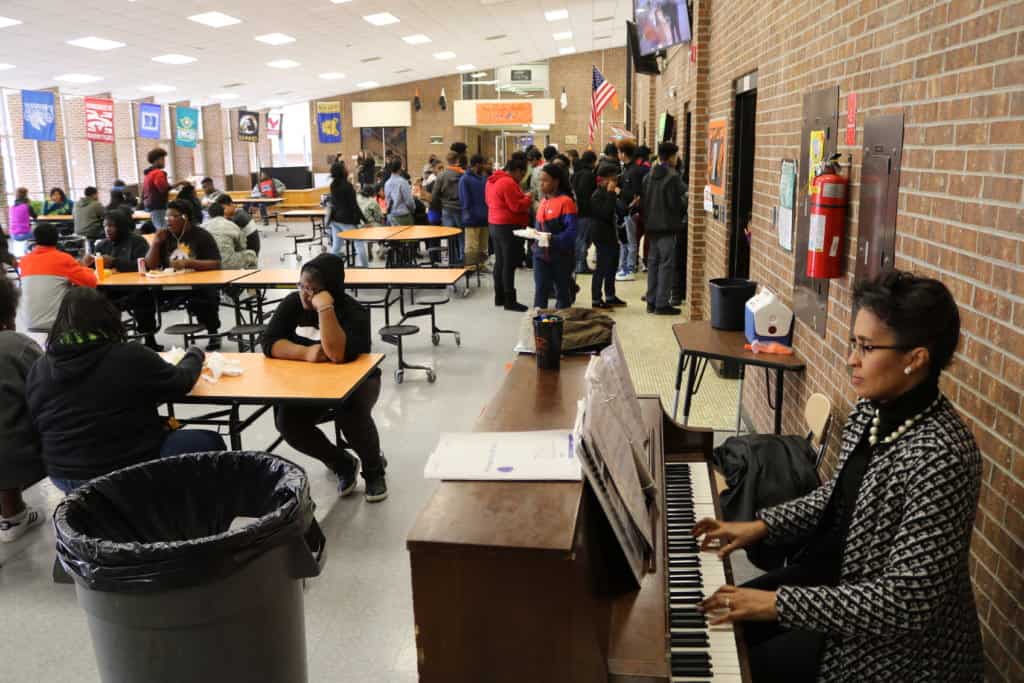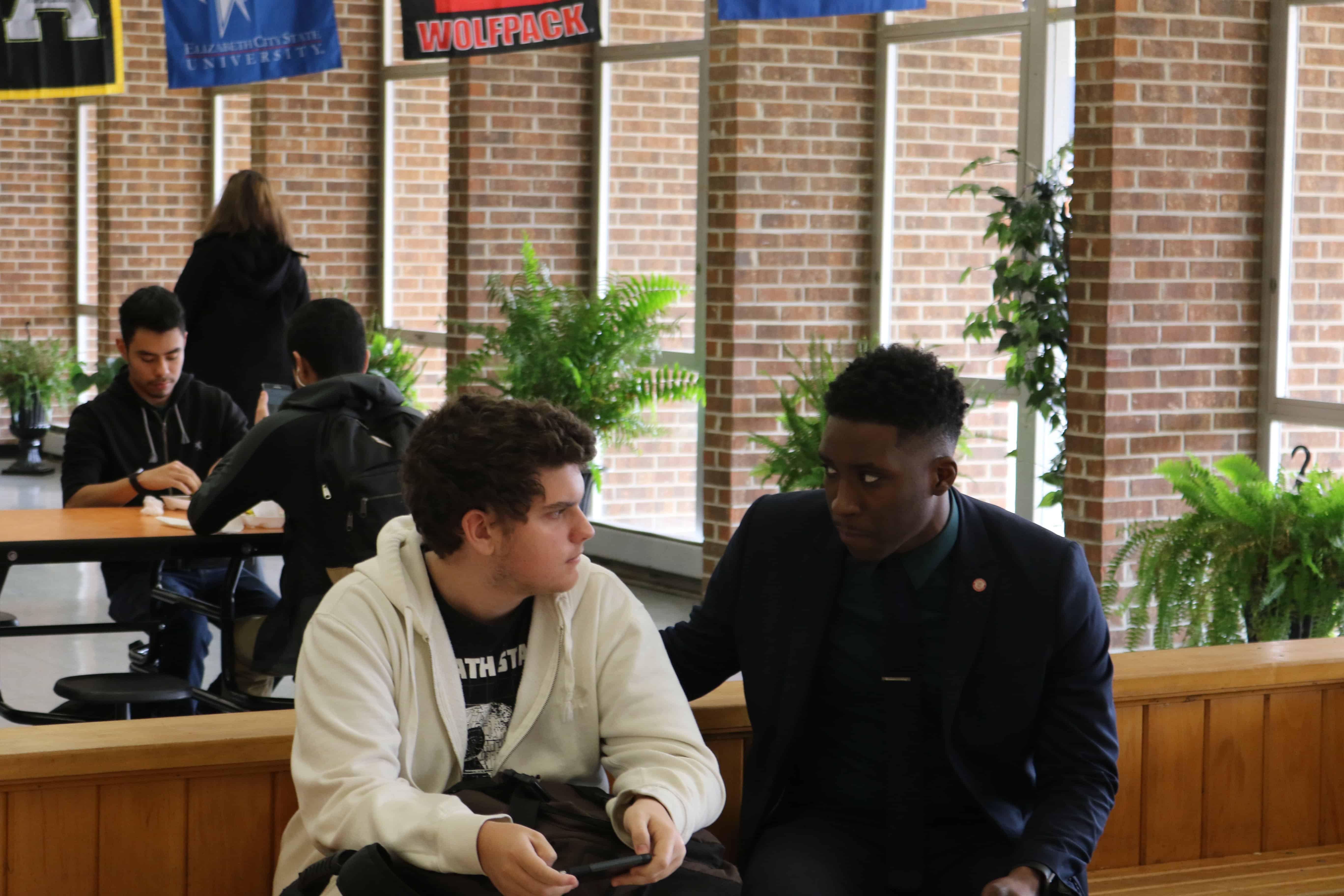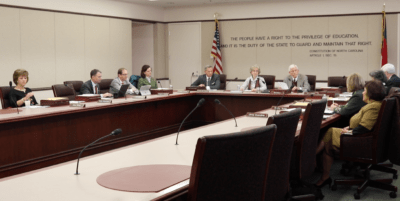On Donnell Cannon’s “walkie-talkie,” which he uses — as does any principal — almost constantly, there’s a sticker that reads “servant leader.”
He asked for that label rather than “principal” or “staff.” Subtle messages are important to Cannon. Language, he said, matters — and informs the way people behave. The phrase “servant leader,” for example, plays out in almost everything Cannon does in a day at North Edgecombe High School.
From 7:15 AM to around 1 PM on Thursday, Cannon didn’t go down a single hallway or turn a single corner without encouraging a student or staff member. He starts each day by greeting students as they get off the bus and doesn’t stop persistently “pouring into” those around him, reminding them that they’re valued and capable. That’s another phrase he uses all the time — something assistant principal Jenny O’Meara calls a “Cannonism.”
Cannon signaled to a student to pull out her headphones as she got off the bus because she didn’t hear his compliment the first time. “Nice shoes!,” he said to the girl.
“Maggie, good to see you!,” Cannon said to another student. “Jay-Jay, how’s it going?” O’Meara and Cannon gave out a constant flow of personalized hellos.
North Edgecombe is a small high school with about 250 students, which Cannon said is one of his favorite aspects of the school. Like many schools in eastern North Carolina, there are high levels of poverty. One hundred percent of North Edgecombe’s student population receives free-and-reduced price lunch. Cannon explained that opportunity gaps in many students’ lives have led to achievement gaps academically.
Cannon knows every student by name and can usually recite what subject and which teacher they have for each of their four periods. And his knowledge of students’ lives doesn’t stop there. He asks how their parents are by name. He knows who’s dating and who’s friends. He knows family problems, sicknesses, weaknesses, personality quirks. He knows and talks about students as valuable people, and describes his work and his role in their lives with another phrase: “high-stakes.”
A new place
Cannon started at North Edgecombe in April of 2016. He has never been a principal before and, when he started, he still had a month to go in his principal prep program at the Northeast Leadership Academy (NELA).
The academy selects and trains high-performing teachers with any level of experience for administrative roles. It’s a break in the normal path to principalship, which you can read more about here. O’Meara also went to NELA, and the two claim the academy has given them a unique perspective on how they approach leading the school.
Firstly, they’re young. Cannon is 27 and O’Meara is 30. Just a couple years ago, they were on the other side of the classroom. They can relate to students and their struggles. Plus, they understand the importance of technology in learning.
“We have an idea of what 21st century classrooms should look like,” Cannon said.
Secondly, they’re not afraid to think outside the box, and they’re not burnt out. Years of experience can be invaluable, but it can also be confining. They can think of new, fresh ideas that decades in the profession could stifle, and they are able to support each other’s creativity.
“(Our thinking) is not based on, ‘This is how school has to be,'” O’Meara said.
Cannon said he wouldn’t have the confidence to take risks without having O’Meara by his side telling him to go for it.
Thirdly, and possibly most importantly, NELA has a network. At any time, Cannon and O’Meara said they feel they can call a number of people on the phone and ask for advice. Each participant in the program has a coach who acts as a lifelong mentor.
John Farrelly, the superintendent of Edgecombe County Schools, was the reason Cannon jumped into this role after NELA and ended up in this part of the state. Through his prior teaching, he was invested in the Halifax community and felt he was making a difference there. Then he met Farrelly. As a superintendent who has worked to revitalize the entire district, Farrelly saw something in Cannon and gave him the job.
“He really revolutionizes our work,” Cannon said. “We’re deeply connected. I thought he was nuts, but the guy just believed in me.”
The team
Of course, there were challenges to coming in as a new, young guy with a lot of energy. Turnover this year was high. Cannon said almost half of the instructional staff is new. He said he was up front with everyone at the school and had to have crucial conversations about their beliefs in children’s potential.
“Change is messy,” Cannon said he told them. A lot of people, he said, weren’t ready for the change that was coming or the hard work that was necessary to bring that change.
As Cannon built his team, he tapped into his NELA and Teach for America connections to find like-minded educators — people he said who have a love for teaching and a love for social justice.
“The two can’t be detached,” he said. One of the first questions he asked each applicant was: “Why are people poor?” Cannon said getting to know the hearts of people was more important than how well they could teach math.
Investing in human capital, Cannon said, was his priority. When he looked at his available funding, Cannon cut programs and shifted money to hire two instructional coaches — who help improve both teachers and students — and a math interventionist. Cannon is extremely proud of the group he ended up with.
As he introduced me to people, he bragged about science teacher Renee Crandol, who has been at the school for 28 years and has a more traditional teaching style. She also plays piano in the cafeteria every day.
“Sometimes, you gotta go back to the basics,” Cannon said. We sat in on Crandol’s lesson on Punnett squares as Cannon took mental notes on her teaching methods. “She has great control of everyone in the class right now,” Cannon said. Crandol was calling on random students to answer as they went over a worksheet. One student got stuck while answering a question in front of the class. A nearby student, feeling bad for him, whispered the answer.


Cannon leaned over and wondered out loud what technique Crandol could use to assess each student’s understanding of the material. “He doesn’t get it,” Cannon said, speaking of the student who was struggling. “We’re not setting him up for success on his quiz tomorrow.”
We sat in the back of several new teachers’ classes too. In an English class, first-year teacher Sayre Olson walked through rows of desks as children used a computer reading program that picked passages and questions based on their Lexile (reading) levels. Olson projected a chart onto the white board with students’ “knowledge points,” which they earned as they went through passages. Cannon described Olson as “humble, hungry, and smart,” and said, in a couple years, he thinks she’ll be the best teacher in the building.
“Look how every kid is working relentlessly,” Cannon said. “There are all of these extrinsic and intrinsic motivators.”
When Olson was transitioning to a new activity, she thanked students by name as they took our their earphones and directed their attention to her.
“She’s affirming positive behavior,” Cannon said.
As one student continued working on his laptop, she persisted in getting the student’s attention. Cannon was thrilled, and said that was a direct response to his feedback. He recently told Olson that she sometimes let up on students too soon and needed to wait for 100 percent before moving on.
“She is so receptive to feedback,” Cannon said. “I’ll tell her something, and she’ll fix it the very next day.”
Power
“I’m gonna be in classes more often,” Cannon said to a female student with a severe social-emotional disorder who he’d pulled out of class to check on. “I haven’t been around as much lately, have I?”
She was excited. Cannon talked with this student throughout the day, checking that she was talking to other students and feeling okay. They tapped elbows — that’s their thing — before she returned to class.
Cannon explained that he hadn’t been in the classroom as much as he’d like because of his planning for a new schedule.
“We’re re-thinking the school day,” Cannon said. “We’re bringing fun back to school.”
POWER — which stands for plan, organize, work, eat, and relax — is probably the thing Cannon is most excited about at North Edgecombe. He’s recruited several student leaders to be a part of creating the schedule. He’s taken students, teachers, and support staff on school visits in Johnston County to see the program in action.
Cannon said it will look like this: two back-to-back 45-minute POWER blocks where students will have the freedom to choose how they spend their time. They’ll have the option of going to remediation for specific classes, studying in lounge areas, eating and relaxing, playing a sport, or going to a club. Teachers are still coming up with a variety of clubs, but they could be anything from yoga to community-service projects.
Students will even be able to grab their lunches and take them elsewhere in the building during POWER. Giving students freedom, Cannon said, gives them the opportunity to be curious. He’s buying ping pong tables, new computers for a lab, and corn hole boards. He wants to bring diverse experiences to students that they might not be exposed to otherwise.
Instead of being scared of what kids might do and focused on strict rules and confinement, Cannon allows students to freely move around the cafeteria. They can have their cell phones out in the halls and use social media. They can go outside during lunch to the courtyard.
Change
I broke through Cannon and O’Meara’s positivity only for a second. They admitted that every day is a true challenge as a professional and as a person.
“It’s been really hard,” O’Meara said. “We’re pulled in 9,000 directions every day.”
O’Meara had just had a hard conversation with a student who made a gang reference in the hallway and wouldn’t stop using inappropriate language. She said moments like these are emotionally tiring. But right after she finished speaking with the student, Cannon walked up. They brainstormed a creative way to teach the student a lesson and prevent the behavior in the future — something called a “restorative practice.”
They decided to have him write a paper on why his behavior was wrong, and then have O’Meara mark it up, return it to the student, and make him correct it. Maybe then even give it to Cannon, have him mark it up, and make the student write it yet again. They thought it would work. They were both back to smiling.
The challenges, and even mistakes, are worth it to O’Meara.
“I’d rather go home frustrated about something I screwed up than go home feeling good about a mediocre day,” she said.
“We get more confident in this job every day,” Cannon said. They said they feel themselves growing and becoming better leaders. And they’re seeing an impact.
Though they’ll have to wait for a full year to end before they can assess academic progress, they said they’ve seen a mindset shift. Teachers are more confident in their work. They’re buying in to the vision Cannon and O’Meara have for the school. O’Meara told a story that she describes as a turning point when, after Hurricane Matthew hit in October, the school hosted a community day where they invited families and served food.
She said teachers started to see her and Cannon’s love for children — that they’re all about serving kids. They both said they came back to school the next day and felt more unified. They hear teachers talk about the change they’re seeing in students.
“Kids are being affirmed every day,” O’Meara said. That, Cannon agreed, is the difference.
Editor’s Note: Donnell Cannon serves on the EdNC Board of Directors.



